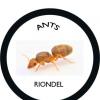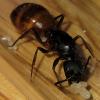- Formiculture.com
- Forums
- Gallery
- Members
- Member Map
- Chat

Discussion about collecting wild colonies
Started By
AntaholicAnonymous
, May 10 2023 5:38 AM
31 replies to this topic
#1
 Offline
-
Posted May 10 2023 - 5:38 AM
Offline
-
Posted May 10 2023 - 5:38 AM
Usually I would be against taking entire colonies out of the wild... However.. today I was I a forest and flipped a rock and saw hundreds of formica fusca ants crawling underneath. Beautiful.
I felt the overwhelming urge to hunt the queen down and take them home with me but I can see arguments why you shouldn't.
What are your thoughts on it?
Definite no?
Maybe leave protected/endangered and rare species alone but take one Colonie of a very common species?
Id like to hear your thoughts. I can't stop thinking about that colony and the amazing setup I could provide for them.
I felt the overwhelming urge to hunt the queen down and take them home with me but I can see arguments why you shouldn't.
What are your thoughts on it?
Definite no?
Maybe leave protected/endangered and rare species alone but take one Colonie of a very common species?
Id like to hear your thoughts. I can't stop thinking about that colony and the amazing setup I could provide for them.
#2
 Offline
-
Posted May 10 2023 - 5:50 AM
Offline
-
Posted May 10 2023 - 5:50 AM

There she is. I hope that's fusca I'm bad at identifying workers.
She's pretty and I'd love to steal her entire family. Don't know if I should tho. lol
#3
 Offline
-
Posted May 10 2023 - 6:09 AM
Offline
-
Posted May 10 2023 - 6:09 AM

POPULAR
Our planet is simply too small, and our remaining wild areas are too fragmented to sustainably harvest anything from the wild anymore. History has shown time and again how destructive the wild harvesting of plants and animals can be. Though it may seem like an easy way to get an ant colony, digging up a nest for your enjoyment is an unnecessary and destructive practice. This is especially true with rare species.
Numerous studies have shown an alarming loss of insect diversity on a global scale. Insects around the world are facing various threats from habitat loss, climate change, invasive species, and pesticides. Ants are no exception. When you truly consider how few queens actually survive to found a successful colony, you will realize how special a mature colony is. If a person digs up such a colony, they have essentially removed one of the “all-stars” from the breeding pool. Even if the colony thrives in your care, it will no longer be able to easily share its successful genes for the benefit of the local population. It is more likely, though, that the colony will struggle to adapt to the strange new conditions of captivity. Most colonies removed this way tend to decline in health until they ultimately fail. There is also a high risk of injuring the queen during the digging process.
There is a natural redundancy built into every nuptial flight. Each colony lets out as many queens as they can in the hopes that just a few will survive. Responsibly collecting a few of these queens will have no more adverse effect on local populations than would collecting a few acorns or pine cones.
Finding a new queen and starting from scratch will always be more rewarding than taking short cuts. You will observe the full life cycle from its most delicate beginnings and develop a deep bond with your queen. Your colony will have time to grow and adjust to your home conditions, resulting in better health overall and a more fulfilling experience. Please do not remove established colonies from the wild and help spread the word against this practice!
Edited by ANTdrew, May 10 2023 - 6:12 AM.
- AntaholicAnonymous, aznphenom, Ants_Dakota and 8 others like this
"The ants are a people not strong, yet they prepare their meat in the summer." Prov. 30:25
Keep ordinary ants in extraordinary ways.
Keep ordinary ants in extraordinary ways.
#4
 Offline
-
Posted May 10 2023 - 6:26 AM
Offline
-
Posted May 10 2023 - 6:26 AM
Our planet is simply too small, and our remaining wild areas are too fragmented to sustainably harvest anything from the wild anymore. History has shown time and again how destructive the wild harvesting of plants and animals can be. Though it may seem like an easy way to get an ant colony, digging up a nest for your enjoyment is an unnecessary and destructive practice. This is especially true with rare species.
Numerous studies have shown an alarming loss of insect diversity on a global scale. Insects around the world are facing various threats from habitat loss, climate change, invasive species, and pesticides. Ants are no exception. When you truly consider how few queens actually survive to found a successful colony, you will realize how special a mature colony is. If a person digs up such a colony, they have essentially removed one of the “all-stars” from the breeding pool. Even if the colony thrives in your care, it will no longer be able to easily share its successful genes for the benefit of the local population. It is more likely, though, that the colony will struggle to adapt to the strange new conditions of captivity. Most colonies removed this way tend to decline in health until they ultimately fail. There is also a high risk of injuring the queen during the digging process.
There is a natural redundancy built into every nuptial flight. Each colony lets out as many queens as they can in the hopes that just a few will survive. Responsibly collecting a few of these queens will have no more adverse effect on local populations than would collecting a few acorns or pine cones.
Finding a new queen and starting from scratch will always be more rewarding than taking short cuts. You will observe the full life cycle from its most delicate beginnings and develop a deep bond with your queen. Your colony will have time to grow and adjust to your home conditions, resulting in better health overall and a more fulfilling experience. Please do not remove established colonies from the wild and help spread the word against this practice!
Absolutely. ![]()
- AntaholicAnonymous likes this
#5
 Offline
-
Posted May 10 2023 - 7:07 AM
Offline
-
Posted May 10 2023 - 7:07 AM
Thank you for that.
I know all of those things but the devil on my other shoulder just got ahold of me for a brief second.
I agree with you fully I just wanted them so much that I started looking for justifications.
I love ants and not just to own them. We do have responsibilities and I'll just visit them at their home more often and get ready for the nuptial flights.
I know all of those things but the devil on my other shoulder just got ahold of me for a brief second.
I agree with you fully I just wanted them so much that I started looking for justifications.
I love ants and not just to own them. We do have responsibilities and I'll just visit them at their home more often and get ready for the nuptial flights.
- ANTdrew, gs5248 and DinoH like this
#6
 Offline
-
Posted May 10 2023 - 9:20 AM
Offline
-
Posted May 10 2023 - 9:20 AM
I am against taking large native colonies, however I believe they are good to take if they are invasive. Taking invasive ants with a sure way to contain them is what I believe is good for the environment. It stops their spread and helps the ecosystem become more native friendly. I just tink it is more ethical to only take invasive colonies. You can always catch queens of anything during nuptial flight season as well.
- ANTdrew, bmb1bee and DinoH like this
Interested buying in ants? Feel free to check out my shop!
Feel free to read my journals, like this one.
Wishlist:
Atta sp (wish they were in CA), Crematogaster cerasi, Most Pheidole species
#7
 Offline
-
Posted May 10 2023 - 10:40 AM
Offline
-
Posted May 10 2023 - 10:40 AM
That's a good point.
Here in my area of Austria I've not been able to identify an invasive colony yet.
I'm glad solenopsis invicta aren't a problem here.
Once I accidentally caught a whole colony of acorn ants that hid in moss I collected.
They are incredibly small in size and numbers and almost invisible in the foliage.
Unfortunately the manica rubida in that terrarium caught on and did a massive raid and tore them into pieces. The definition of overkill.
It was hard to watch but very impressive to see them go to war.
Here in my area of Austria I've not been able to identify an invasive colony yet.
I'm glad solenopsis invicta aren't a problem here.
Once I accidentally caught a whole colony of acorn ants that hid in moss I collected.
They are incredibly small in size and numbers and almost invisible in the foliage.
Unfortunately the manica rubida in that terrarium caught on and did a massive raid and tore them into pieces. The definition of overkill.
It was hard to watch but very impressive to see them go to war.
- AntsCali098 and DinoH like this
#8
 Offline
-
Posted May 10 2023 - 2:08 PM
Offline
-
Posted May 10 2023 - 2:08 PM
That's great that you're seeing no invasives there. They are everywhere around my neighborhood.That's a good point.
Here in my area of Austria I've not been able to identify an invasive colony yet.
I'm glad solenopsis invicta aren't a problem here.
Once I accidentally caught a whole colony of acorn ants that hid in moss I collected.
They are incredibly small in size and numbers and almost invisible in the foliage.
Unfortunately the manica rubida in that terrarium caught on and did a massive raid and tore them into pieces. The definition of overkill.
It was hard to watch but very impressive to see them go to war.
Edited by AntsCali098, May 10 2023 - 2:09 PM.
- AntaholicAnonymous and DinoH like this
Interested buying in ants? Feel free to check out my shop!
Feel free to read my journals, like this one.
Wishlist:
Atta sp (wish they were in CA), Crematogaster cerasi, Most Pheidole species
#9
 Offline
-
Posted May 10 2023 - 2:57 PM
Offline
-
Posted May 10 2023 - 2:57 PM
It is not so black and white as people make it out to be. There is gray area however that is where people tend to mess up. For My rules for collecting wild colonies I have condensed it into a check list and if all of the criteria is met then you are good to go:
No Alates or Alate Larvae Are Present
Species is Common/Semi Common
Colony is in a Densely Populated Area (of the same species)
There are also a few other things to keep in mind such as highly polygonous colonies. Some ants have multiple queens per colony and you might find a wild colony with multiple. You may be able to take a single queen with workers and brood and you should be fine. For instance, I have collected a wild Pheidole colony before however there were roughly 5 queens present (there could have been more) so I took a single queen, around 50 workers and a nice chunk of brood.
In conclusion, the collection of wild colonies can be done properly but keep in mind what species it is and where you are. Some ants are needed in certain areas than others.
- AntaholicAnonymous, bmb1bee and AntsCali098 like this
Currently: Considering moving to Australia
Reason: Myrmecia
Reason: Myrmecia
#10
 Offline
-
Posted May 10 2023 - 5:56 PM
Offline
-
Posted May 10 2023 - 5:56 PM
I personally don’t see a problem with collecting wild colonies, as long as you aren’t overdoing it that is. Some species have ergatoid queens and/or exclusively reproduce by budding so it is literally impossible to found from a single queen in those cases, and in others like harpagoxenus the chances of even finding a lone queen are basically zero due to the tiny size and even then founding a slave maker like that is a difficult task.
Also I’m somewhat worried this thread is gonna devolve into unnecessary drama as the collection of wild colonies is a bit of a controversial topic.
Also I’m somewhat worried this thread is gonna devolve into unnecessary drama as the collection of wild colonies is a bit of a controversial topic.
- AntaholicAnonymous, bmb1bee, AntsCali098 and 2 others like this
My journals:
Polyergus Mexicanus: https://www.formicul...gs/#entry175528
Lasius minutus: https://www.formicul...cs/#entry174811
Lasius latipes: https://www.formicul...gs/#entry206449
General acanthomyops journal: https://www.formicul...yops-with-eggs/
Polyergus Mexicanus: https://www.formicul...gs/#entry175528
Lasius minutus: https://www.formicul...cs/#entry174811
Lasius latipes: https://www.formicul...gs/#entry206449
General acanthomyops journal: https://www.formicul...yops-with-eggs/
#11
 Offline
-
Posted May 10 2023 - 7:07 PM
Offline
-
Posted May 10 2023 - 7:07 PM
I agree with ANTdrew and AntsCali, but I would like to note one exception I sometimes to go by. If a colony is in an area where they are going to be destroyed, it's okay to take them as they'll die otherwise. ie, your neighbors are planning to call in pest control for a colony that's invading their house, or a family member needs them out of their plant pots. If possible, its definitely best to release alates (or the colony) back into the nearby area, but sometimes there may not be room nearby for another colony. As much as we all understand the importance of ants within their ecosystems, and the ramifications of them disappearing, most people aren't going to care about that when their kitchen is being raided. Plus the species doing the raiding are often common and not in any danger of disappearing in an area. In my opinion, it's more effective to collect the colonies and use them to teach people about ants than it is to advocate for leaving them be when they'll be killed otherwise.
It's also important to acknowledge that taking any mature colony out of the wild will have an impact on that species' population in the area and the overall ecosystem. When new colonies inevitably move to take the area of the removed one, they might not be the same species, and even if they are that will have an impact on the overall ant biodiversity in an area. Because of this, taking a colony out of the wild needs to be done responsibly and only in rare cases.
Edited by madbiologist, May 10 2023 - 7:26 PM.
- ANTdrew, AntaholicAnonymous, Ants_Dakota and 3 others like this
#12
 Offline
-
Posted May 10 2023 - 11:39 PM
Offline
-
Posted May 10 2023 - 11:39 PM
Looks like you'll have to look at what exactly you're doing for what purpose in what context.
In my case I was looking for a shortcut to having a thriving colony of a species I love while taking them out of a healthy forest.
Can't justify that. That's a straight no.
Rescuing a colony from what's going to be a construction site or from pest control measures makes sense.
I really like those responses and even if a discussion might heat up slightly as long as it stays respectful I think that's a good thing. It's an important topic and to compare notes and maybe adjusting an opinion with new information is exactly what I appreciate about talking with all of you here.
In my case I was looking for a shortcut to having a thriving colony of a species I love while taking them out of a healthy forest.
Can't justify that. That's a straight no.
Rescuing a colony from what's going to be a construction site or from pest control measures makes sense.
I really like those responses and even if a discussion might heat up slightly as long as it stays respectful I think that's a good thing. It's an important topic and to compare notes and maybe adjusting an opinion with new information is exactly what I appreciate about talking with all of you here.
- rptraut and DinoH like this
#13
 Offline
-
Posted May 11 2023 - 12:16 AM
Offline
-
Posted May 11 2023 - 12:16 AM
I'd like to expand the question a little further. What do you think about brood boosting with wild caught pupae?
It is less destructive but still interfering with a wild colony.
With warm weather where the pupae might be sitting close to the surface you won't have to disturb the nest too much and maybe only take the minimum to boost a colony in the first stages.
If the species is very common and the colony is large, maybe offering them some resources in exchange for a small fraction of pupae could be reasonable.
Some might be fully against it but there's a lot of context and way of execution that makes it more or less acceptable.
For example messing with colonies that already have a hard time fighting off invasives can be very dangerous.
What is your take on that form of brood boosting?
It is less destructive but still interfering with a wild colony.
With warm weather where the pupae might be sitting close to the surface you won't have to disturb the nest too much and maybe only take the minimum to boost a colony in the first stages.
If the species is very common and the colony is large, maybe offering them some resources in exchange for a small fraction of pupae could be reasonable.
Some might be fully against it but there's a lot of context and way of execution that makes it more or less acceptable.
For example messing with colonies that already have a hard time fighting off invasives can be very dangerous.
What is your take on that form of brood boosting?
- ZTYguy likes this
#14
 Offline
-
Posted May 11 2023 - 5:11 AM
Offline
-
Posted May 11 2023 - 5:11 AM
I'd like to expand the question a little further. What do you think about brood boosting with wild caught pupae?
It is less destructive but still interfering with a wild colony.
With warm weather where the pupae might be sitting close to the surface you won't have to disturb the nest too much and maybe only take the minimum to boost a colony in the first stages.
If the species is very common and the colony is large, maybe offering them some resources in exchange for a small fraction of pupae could be reasonable.
Some might be fully against it but there's a lot of context and way of execution that makes it more or less acceptable.
For example messing with colonies that already have a hard time fighting off invasives can be very dangerous.
What is your take on that form of brood boosting?
Brood boosting isn't a bad thing... especially if you only take 30-50 pupa from a large colony. and if you really feel bad about it just feed them 30-50 pupa worth of protien.
#15
 Offline
-
Posted May 11 2023 - 5:30 AM
Offline
-
Posted May 11 2023 - 5:30 AM
IMO it's perfectly fine to collect colonies as long as you know you can get a queen or multiple, fill in the hole, and that the ants you're digging up are locally abundant/abundant all over the state. Most midwestern ant keepers have at least a few dug up colonies since it's nearly impossible for us to catch flights of certain ants in the Midwest if you don't live right next to a sand prairie, such as Pheidole bicarinata or Aphenogastor treatae. I've also went back to the same places I've dug up ants before for multiple years and there's never been a difference from only taking one or two small colonies, or taking a few queens and a few hundred workers out of a mature Formica colony. Colonies of locally abundant ants should never be collected in large amounts though, but taking 1 or 2 small/medium colonies won't hurt a population. As long as you stay respectful to the environment and know what you're doing collecting colonies is fine.
- Manitobant, antsinvirgina, bmb1bee and 1 other like this
#16
 Offline
-
Posted May 11 2023 - 6:19 AM
Offline
-
Posted May 11 2023 - 6:19 AM
IMO it's perfectly fine to collect colonies as long as you know you can get a queen or multiple, fill in the hole, and that the ants you're digging up are locally abundant/abundant all over the state. Most midwestern ant keepers have at least a few dug up colonies since it's nearly impossible for us to catch flights of certain ants in the Midwest if you don't live right next to a sand prairie, such as Pheidole bicarinata or Aphenogastor treatae. I've also went back to the same places I've dug up ants before for multiple years and there's never been a difference from only taking one or two small colonies, or taking a few queens and a few hundred workers out of a mature Formica colony. Colonies of locally abundant ants should never be collected in large amounts though, but taking 1 or 2 small/medium colonies won't hurt a population. As long as you stay respectful to the environment and know what you're doing collecting colonies is fine.
Fair enough, but the size of the colony is irrelevant. Small colonies are needed to grow and replace large colonies. This is exactly why there are size limits set for fishing, for example.
- DinoH likes this
"The ants are a people not strong, yet they prepare their meat in the summer." Prov. 30:25
Keep ordinary ants in extraordinary ways.
Keep ordinary ants in extraordinary ways.
#17
 Offline
-
Posted May 11 2023 - 6:56 AM
Offline
-
Posted May 11 2023 - 6:56 AM
I find it is just a lot easier to catch Queens during a nuptial flight. I would not even bother digging up an older colony. But that is just my opinion.
- DinoH likes this
#18
 Offline
-
Posted May 11 2023 - 6:59 AM
Offline
-
Posted May 11 2023 - 6:59 AM
IMO it's perfectly fine to collect colonies as long as you know you can get a queen or multiple, fill in the hole, and that the ants you're digging up are locally abundant/abundant all over the state. Most midwestern ant keepers have at least a few dug up colonies since it's nearly impossible for us to catch flights of certain ants in the Midwest if you don't live right next to a sand prairie, such as Pheidole bicarinata or Aphenogastor treatae. I've also went back to the same places I've dug up ants before for multiple years and there's never been a difference from only taking one or two small colonies, or taking a few queens and a few hundred workers out of a mature Formica colony. Colonies of locally abundant ants should never be collected in large amounts though, but taking 1 or 2 small/medium colonies won't hurt a population. As long as you stay respectful to the environment and know what you're doing collecting colonies is fine.
Fair enough, but the size of the colony is irrelevant. Small colonies are needed to grow and replace large colonies. This is exactly why there are size limits set for fishing, for example.
I'm responding to this thread in my capacity as an entomologist and PhD student at the University of Florida -- and as an ant keeper. I see a need to acknowledge that this topic is nuanced and that blanket statements aren't all that helpful in convincing folks of scientific findings.
Of course the size (life stage) of the colony is relevant. I'd caution against making strong and inflexible statements in the realm of biology, as they betray the otherwise scientifically-accurate points that are being made. Nuance is critical in science and biology in particular, as well as in communications about science. Removing an incipient colony has very different impacts than removing an established, reproductive-producing colony. That's just objectively the situation, and synonymizing those impacts is intellectually dishonest and intuitively not the case, which reduces perceptions of credibility on the whole.
Organisms CAN -- in some circumstances -- be taken from the wild sustainably. That said, ANTdrew is entirely right that we are experiencing an "insect apocalypse" of sorts, and it's of huge interest to and focus of the entomological community. There is hardly a week that goes by that my colleagues and I don't discuss this topic and what may be done to 1) increase understanding of what's going on and 2) develop mitigation strategies. Ant keepers removing species from the natural world can certainly be a threat. An example of this would be Pheidole rhea or Atta mexicana in the southwestern United States, where small, disjunct populations can easily be overcollected and pushed over the brink from unbridled ant keeper collection pressure. On the flip side, each year Pogonomyrmex barbatus hold immense mating flights, and the removal of even a hundred or more queens at a time during that process would have little impact.
One of the most important parts that ANTdrew brought up is one of survival in captivity. Chances are good that the stress incurred by the colony in the collection process (particularly when done by a non-professional) could have fatal consequences. Rearing colonies from newly-mated queens is nearly always a better option, and certainly the more ethical and sustainable route for new ant enthusiasts.
My best recommendation is that less experienced ant keepers (3+ full years) should be particularly hesitant to attempt to collect established colonies. Sourcing your colonies from new queens is the best path to success. For more experienced keepers, some species that are unattainable through that methodology can be responsibly collected after an evaluation of that species' presence in the habitat, an educated plan is made for whole colony extraction (I have a no ant left behind policy) and a nesting environment and collecting box is prepared. It can be done responsibly, though that varies considerably depending on a litany of factors.
Cheers,
Miles
Edited by Miles, May 11 2023 - 7:02 AM.
- Ants_Dakota, UtahAnts, bmb1bee and 1 other like this
PhD Student & NSF Graduate Research Fellow | University of Florida Dept. of Entomology & Nematology - Lucky Ant Lab
Founder & Director of The Ant Network. Ant keeper since 2009. Insect ecologist and science communicator. He/Him.
#19
 Offline
-
Posted May 11 2023 - 7:05 AM
Offline
-
Posted May 11 2023 - 7:05 AM
I think in my case the best option is to catch a queen and brood boost her.
I have plans for huge terrariums and I don't want to wait 3 years to have a colony large enough to live in there.
That's the reason I thought about getting a whole colony at first.
I have plans for huge terrariums and I don't want to wait 3 years to have a colony large enough to live in there.
That's the reason I thought about getting a whole colony at first.
- Ernteameise likes this
#20
 Offline
-
Posted May 11 2023 - 7:46 AM
Offline
-
Posted May 11 2023 - 7:46 AM
I think in my case the best option is to catch a queen and brood boost her.
I have plans for huge terrariums and I don't want to wait 3 years to have a colony large enough to live in there.
That's the reason I thought about getting a whole colony at first.
That's probably a good idea, I've brood boosted founding Camponotus and Formica queens before and it makes them grow much faster. Sometimes a 2nd or 3rd year colony can look like a 4th year colony if given enough pupae 1st year.
- AntaholicAnonymous likes this
2 user(s) are reading this topic
0 members, 2 guests, 0 anonymous users























